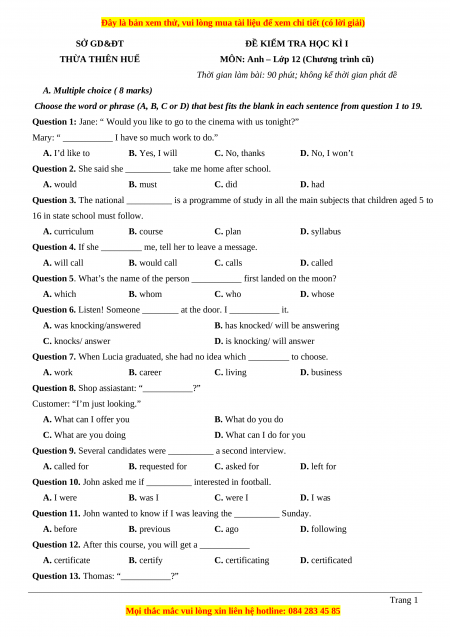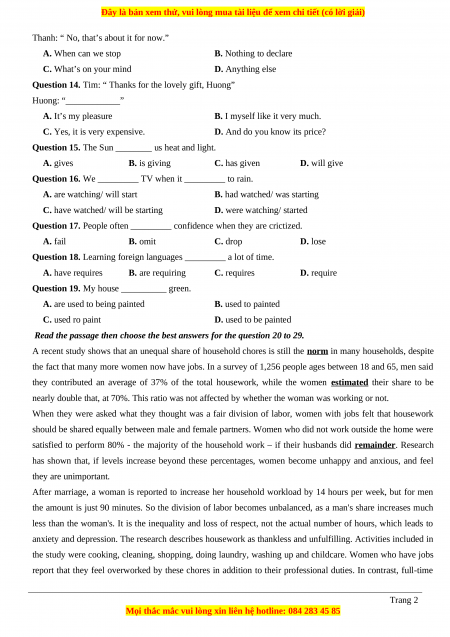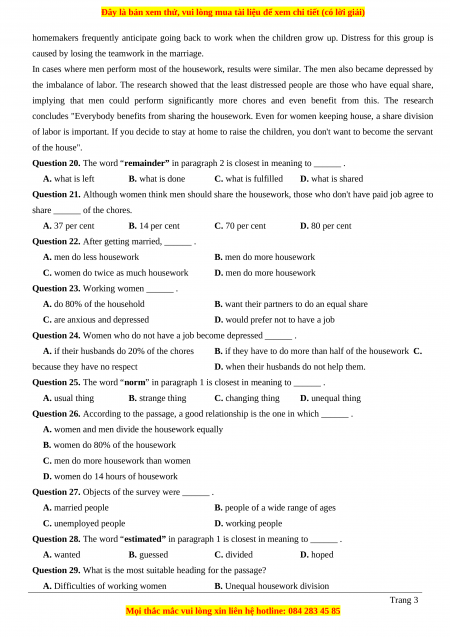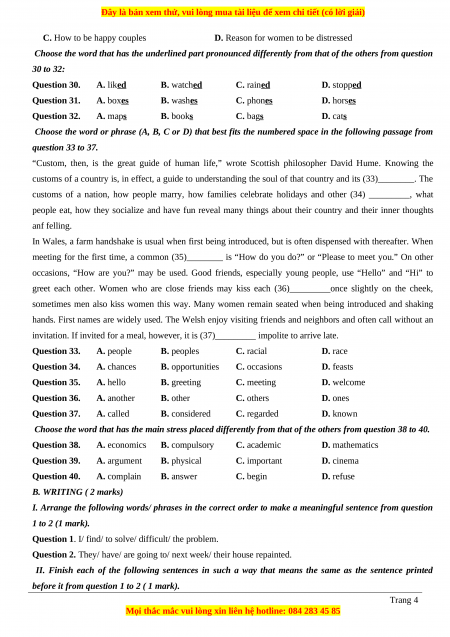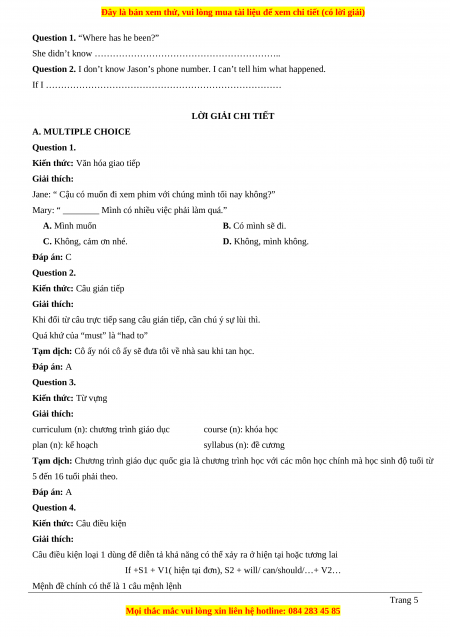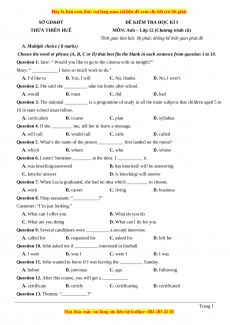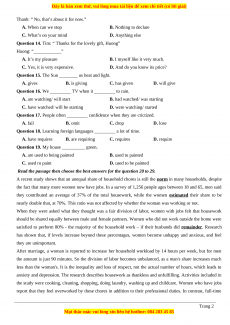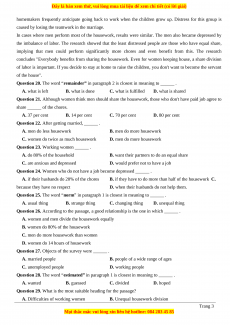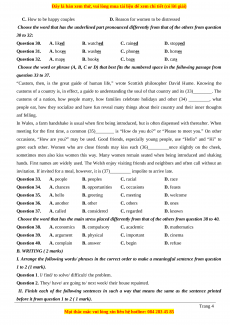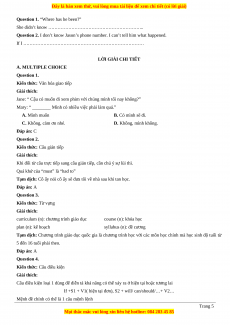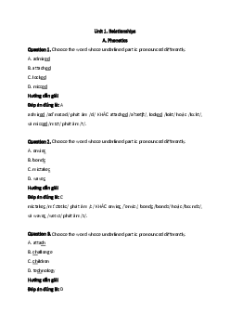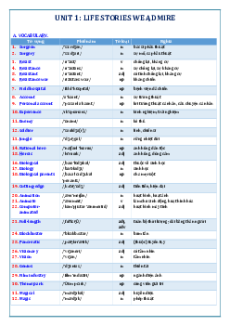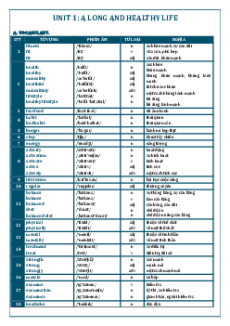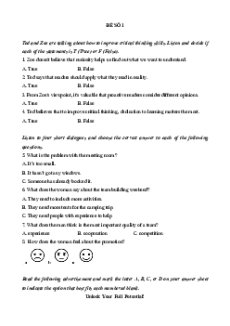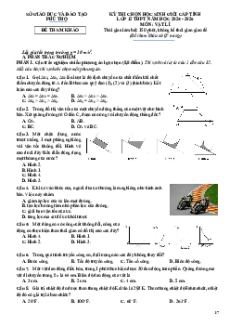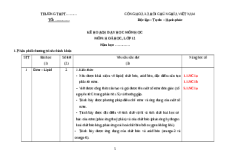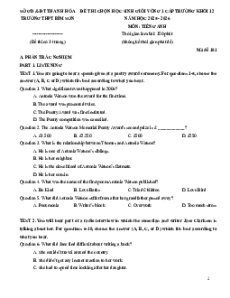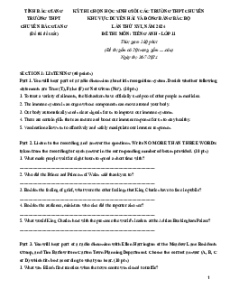SỞ GD&ĐT
ĐỀ KIỂM TRA HỌC KÌ I THỪA THIÊN HUẾ
MÔN: Anh – Lớp 12 (Chương trình cũ)
Thời gian làm bài: 90 phút; không kể thời gian phát đề
A. Multiple choice ( 8 marks)
Choose the word or phrase (A, B, C or D) that best fits the blank in each sentence from question 1 to 19.
Question 1: Jane: “ Would you like to go to the cinema with us tonight?”
Mary: “ ___________ I have so much work to do.” A. I’d like to B. Yes, I will C. No, thanks D. No, I won’t
Question 2. She said she __________ take me home after school. A. would B. must C. did D. had
Question 3. The national __________ is a programme of study in all the main subjects that children aged 5 to
16 in state school must follow. A. curriculum B. course C. plan D. syllabus
Question 4. If she _________ me, tell her to leave a message. A. will call B. would call C. calls D. called
Question 5. What’s the name of the person ___________ first landed on the moon? A. which B. whom C. who D. whose
Question 6. Listen! Someone ________ at the door. I ___________ it.
A. was knocking/answered
B. has knocked/ will be answering C. knocks/ answer
D. is knocking/ will answer
Question 7. When Lucia graduated, she had no idea which _________ to choose. A. work B. career C. living D. business
Question 8. Shop assiastant: “___________?”
Customer: “I’m just looking.”
A. What can I offer you B. What do you do C. What are you doing
D. What can I do for you
Question 9. Several candidates were __________ a second interview. A. called for B. requested for C. asked for D. left for
Question 10. John asked me if __________ interested in football. A. I were B. was I C. were I D. I was
Question 11. John wanted to know if I was leaving the __________ Sunday. A. before B. previous C. ago D. following
Question 12. After this course, you will get a ___________ A. certificate B. certify C. certificating D. certificated
Question 13. Thomas: “___________?” Trang 1
Thanh: “ No, that’s about it for now.” A. When can we stop B. Nothing to declare
C. What’s on your mind D. Anything else
Question 14. Tim: “ Thanks for the lovely gift, Huong” Huong: “____________” A. It’s my pleasure
B. I myself like it very much.
C. Yes, it is very expensive.
D. And do you know its price?
Question 15. The Sun ________ us heat and light. A. gives B. is giving C. has given D. will give
Question 16. We _________ TV when it _________ to rain.
A. are watching/ will start
B. had watched/ was starting
C. have watched/ will be starting
D. were watching/ started
Question 17. People often _________ confidence when they are crictized. A. fail B. omit C. drop D. lose
Question 18. Learning foreign languages _________ a lot of time. A. have requires B. are requiring C. requires D. require
Question 19. My house __________ green.
A. are used to being painted B. used to painted C. used ro paint D. used to be painted
Read the passage then choose the best answers for the question 20 to 29.
A recent study shows that an unequal share of household chores is still the norm in many households, despite
the fact that many more women now have jobs. In a survey of 1,256 people ages between 18 and 65, men said
they contributed an average of 37% of the total housework, while the women estimated their share to be
nearly double that, at 70%. This ratio was not affected by whether the woman was working or not.
When they were asked what they thought was a fair division of labor, women with jobs felt that housework
should be shared equally between male and female partners. Women who did not work outside the home were
satisfied to perform 80% - the majority of the household work – if their husbands did remainder. Research
has shown that, if levels increase beyond these percentages, women become unhappy and anxious, and feel they are unimportant.
After marriage, a woman is reported to increase her household workload by 14 hours per week, but for men
the amount is just 90 minutes. So the division of labor becomes unbalanced, as a man's share increases much
less than the woman's. It is the inequality and loss of respect, not the actual number of hours, which leads to
anxiety and depression. The research describes housework as thankless and unfulfilling. Activities included in
the study were cooking, cleaning, shopping, doing laundry, washing up and childcare. Women who have jobs
report that they feel overworked by these chores in addition to their professional duties. In contrast, full-time Trang 2
homemakers frequently anticipate going back to work when the children grow up. Distress for this group is
caused by losing the teamwork in the marriage.
In cases where men perform most of the housework, results were similar. The men also became depressed by
the imbalance of labor. The research showed that the least distressed people are those who have equal share,
implying that men could perform significantly more chores and even benefit from this. The research
concludes "Everybody benefits from sharing the housework. Even for women keeping house, a share division
of labor is important. If you decide to stay at home to raise the children, you don't want to become the servant of the house".
Question 20. The word “remainder” in paragraph 2 is closest in meaning to ______ . A. what is left B. what is done C. what is fulfilled D. what is shared
Question 21. Although women think men should share the housework, those who don't have paid job agree to share ______ of the chores. A. 37 per cent B. 14 per cent C. 70 per cent D. 80 per cent
Question 22. After getting married, ______ .
A. men do less housework
B. men do more housework
C. women do twice as much housework
D. men do more housework
Question 23. Working women ______ .
A. do 80% of the household
B. want their partners to do an equal share
C. are anxious and depressed
D. would prefer not to have a job
Question 24. Women who do not have a job become depressed ______ .
A. if their husbands do 20% of the chores
B. if they have to do more than half of the housework C. because they have no respect
D. when their husbands do not help them.
Question 25. The word “norm” in paragraph 1 is closest in meaning to ______ . A. usual thing B. strange thing C. changing thing D. unequal thing
Question 26. According to the passage, a good relationship is the one in which ______ .
A. women and men divide the housework equally
B. women do 80% of the housework
C. men do more housework than women
D. women do 14 hours of housework
Question 27. Objects of the survey were ______ . A. married people
B. people of a wide range of ages C. unemployed people D. working people
Question 28. The word “estimated” in paragraph 1 is closest in meaning to ______ . A. wanted B. guessed C. divided D. hoped
Question 29. What is the most suitable heading for the passage?
A. Difficulties of working women
B. Unequal housework division Trang 3
C. How to be happy couples
D. Reason for women to be distressed
Choose the word that has the underlined part pronounced differently from that of the others from question 30 to 32: Question 30. A. liked B. watched C. rained D. stopped Question 31. A. boxes B. washes C. phones D. horses Question 32. A. maps B. books C. bags D. cats
Choose the word or phrase (A, B, C or D) that best fits the numbered space in the following passage from
question 33 to 37.
“Custom, then, is the great guide of human life,” wrote Scottish philosopher David Hume. Knowing the
customs of a country is, in effect, a guide to understanding the soul of that country and its (33)________. The
customs of a nation, how people marry, how families celebrate holidays and other (34) _________, what
people eat, how they socialize and have fun reveal many things about their country and their inner thoughts anf felling.
In Wales, a farm handshake is usual when first being introduced, but is often dispensed with thereafter. When
meeting for the first time, a common (35)________ is “How do you do?” or “Please to meet you.” On other
occasions, “How are you?” may be used. Good friends, especially young people, use “Hello” and “Hi” to
greet each other. Women who are close friends may kiss each (36)_________once slightly on the cheek,
sometimes men also kiss women this way. Many women remain seated when being introduced and shaking
hands. First names are widely used. The Welsh enjoy visiting friends and neighbors and often call without an
invitation. If invited for a meal, however, it is (37)_________ impolite to arrive late. Question 33. A. people B. peoples C. racial D. race Question 34. A. chances B. opportunities C. occasions D. feasts Question 35. A. hello B. greeting C. meeting D. welcome Question 36. A. another B. other C. others D. ones Question 37. A. called B. considered C. regarded D. known
Choose the word that has the main stress placed differently from that of the others from question 38 to 40. Question 38. A. economics B. compulsory C. academic D. mathematics Question 39. A. argument B. physical C. important D. cinema Question 40. A. complain B. answer C. begin D. refuse
B. WRITING ( 2 marks)
I. Arrange the following words/ phrases in the correct order to make a meaningful sentence from question
1 to 2 (1 mark).
Question 1. I/ find/ to solve/ difficult/ the problem.
Question 2. They/ have/ are going to/ next week/ their house repainted.
II. Finish each of the following sentences in such a way that means the same as the sentence printed
before it from question 1 to 2 ( 1 mark). Trang 4
Đề thi học kì 1 Tiếng anh 12 năm 2022 - 2023 (Đề 12)
CÁCH MUA:
- B1: Gửi phí vào TK:
1133836868- CT TNHH DAU TU VA DV GD VIETJACK - Ngân hàng MB (QR) - B2: Nhắn tin tới Zalo VietJack Official ( nhấn vào đây ) để xác nhận thanh toán và tải tài liệu - giáo án
Liên hệ ngay Hotline hỗ trợ: 084 283 45 85
Đề thi được cập nhật liên tục trong gói này từ nay đến hết tháng 6/2023. Chúng tôi đảm bảo đủ số lượng đề đã cam kết hoặc có thể nhiều hơn, tất cả có BẢN WORD, LỜI GIẢI CHI TIẾT và tải về dễ dàng.
Để tải tài liệu gốc về máy bạn click vào nút Tải Xuống ở trên!
Thuộc bộ (mua theo bộ để tiết kiệm hơn):
-
Tailieugiaovien.com.vn giới thiệu bộ 21 đề thi học kì 1 môn Tiếng Anh lớp 12 mới nhất năm 2022 - 2023 nhằm giúp Giáo viên có thêm tài liệu tham khảo ra đề thi Tiếng anh lớp 12.
-
File word có lời giải chi tiết 100%.
-
Mua trọn bộ sẽ tiết kiệm hơn tải lẻ 50%.
Đánh giá
4.6 / 5(530 )Trọng Bình
Giúp ích cho tôi rất nhiều
Duy Trần
Rất thích tài liệu bên VJ soạn (bám sát chương trình dạy)
TÀI LIỆU BỘ BÁN CHẠY MÔN Tiếng Anh
Xem thêmTÀI LIỆU BỘ BÁN CHẠY Lớp 12
Xem thêmTài liệu bộ mới nhất





